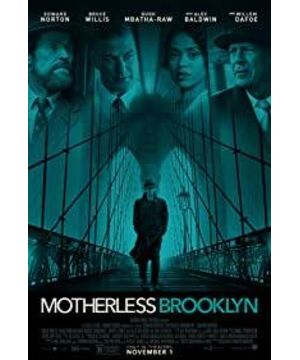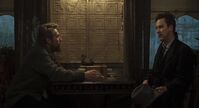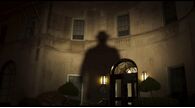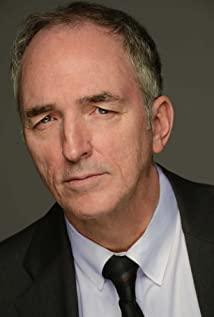I have been looking forward to Norton's new film for a long time, but the viewing experience is not ideal, and the rhythm is a big problem. It can be divided into two aspects, one is that the atmosphere is not enough to make people into the play, and the other is the rigid shaping of the plot including the characters.
Art and soundtrack are all bonus points. From the record of winning (nomination) of the film, it can be seen that (there is even a nomination for an adapted screenplay, which is enough to save face) There is no director and no cinematography. Therefore, it is almost difficult to find directing skills in the film, and there are many narcissistic passages. Norton is a good actor, so he seems to be pampering his performances, and the photography is more of a function - a featureless lighting, a scene that wants to contain all the information, and a very cheap and straightforward dream. / Flashback special effects, these are evidence of the lack of directing skills. The biggest feature is even the immersive experience brought by the first point of view: the subjective camera dominates several important plot twists, making the film very much like a large-scale decryption role-playing game.
As a result, the plot has also slipped into RPG, and the progression of the plot is very blunt: external forces have the absolute upper hand, and the relationship between characters is dry and stylized-all kinds of orphans (objective and derogatory) appearing to match the title, just like in Bioshock A madman like a big boss, wise but not lacking in beautiful women, and a person of color (even thirty times more boring in today's film context than the simple femme fatale in old noir), bad and yet Inexpensive brotherhood (corresponding to this is the inexplicable passers-by who sympathize with each other). Because you know exactly what the director wants to express (he tried too hard), there should be no ambiguity in the relationship between characters, especially in film noir, and the above supporting roles are more or less reduced to symbols.
Hollywood's anti-type, now for at least three decades, many anti-types have become types. At the very beginning, the production idea of this movie seemed to be stuck on a very ancient second-rate genre film, but it doesn't matter, the first drop of blood has flowed to 5, and the Terminator is still fighting. It's just that Norton has been preparing for 20 years, and you can clearly feel his desire for expression (the ugly point is an award), while the play is like what a professional student needs to do in training or entrance exam: a certain turning point, a certain concept, and the integrity of the foundation. The characters carry the meaning forcibly given by the creator, and at the same time, the space is completely unable to lay out their more hidden personalities - on the one hand, the director's use of the scene is very single, this scene is to express this layer of meaning, I can't feel it. Multi-level integration, on the other hand, Norton thinks that labels are extensions of personality (the protagonist does not have much practical symptoms, but in the end, he has to explain every time he encounters a new person, which greatly delays the sense of rhythm, and is also social The protagonist of the orphan, on the other hand, the baby driver, clean and tidy, with action expressions), the cloud screenwriters probably think so. At the same time, the shaping of some supporting roles is simply a mistake made by freshman undergraduates: in the first half hour, after the widow came to the office, two lines of dialogue with Tony, one action, directly destroyed all the burdens on this character; The function he takes on is so comical that he is so out of his depth. Because of the above, they have not become alive, but rigidly appear on the stage of a period drama in a form of patchwork. Perhaps the creators are too focused on the protagonist's exploration/deciphering process, except for the fixed formula. According to the introduction of history, the audience cannot discover what is outside the camera and inside life.
I think that in a profound feature film, the characters should not be burdened with ideas, but with morals and principles. The distinction between what we call commercial films and artistic films is probably also because the former forms a story for the most dramatic elements of the character, so that the characters have to sacrifice more life details and logic. I think this should not be what norton wants, because his plot is too bland, if he needs box office, he must have the ability to make the plot ups and downs, just like the Indian movie "The Tuner", it doesn't make sense, but Absolute drama, no country will be short of such screenwriters. But I don't want to admit that the 20 years of expression caused by lack of ability have nothing to say. The best explanation may be that he is too stubborn.
So go back to what I said in the previous paragraph, there are many careers that have happened, but what should I do in life after that? This should match the rhythm chosen by norton, such as the big Buddha plus. There is no difference between the dense Brooklyn and the damp Tainan. The orphans walking in the fog struggle to find their way in boredom and despair. So the supporting plot is watching the dash cam "to pass the boredom", while in motherless Brooklyn, norton walks into the library, flips through the materials, and goes down to the next scene. The former is from life, the latter is to go into the movie. The former follows the flow of characters in life, while the latter is full of strong motivations given to him by the creator. No character should be a puppet when the audience has the ability to react to the character's every move on the screen.
Life, which is the most important, is too crowded and it will not be like life. There must be blank spaces in life, just like in a movie, there will be unrelated characters in the main line to leave the resonance outside the plot. In Big Buddha Plus, it's the fool in the lighthouse, and in the Ten Commandments, it's the young man who is constantly on the set, but unfortunately, what I remember the most in this movie is the blonde woman who was played by norton three times, the second deepest. It's the front desk of big tits in the bag company, because her breasts are too big.
Edward Norton is my very, very favorite actor, but if he did spend twenty years preparing this film, then I sincerely hope he gets some help the next time he's a director, at least not changing the script himself.
View more about Motherless Brooklyn reviews











